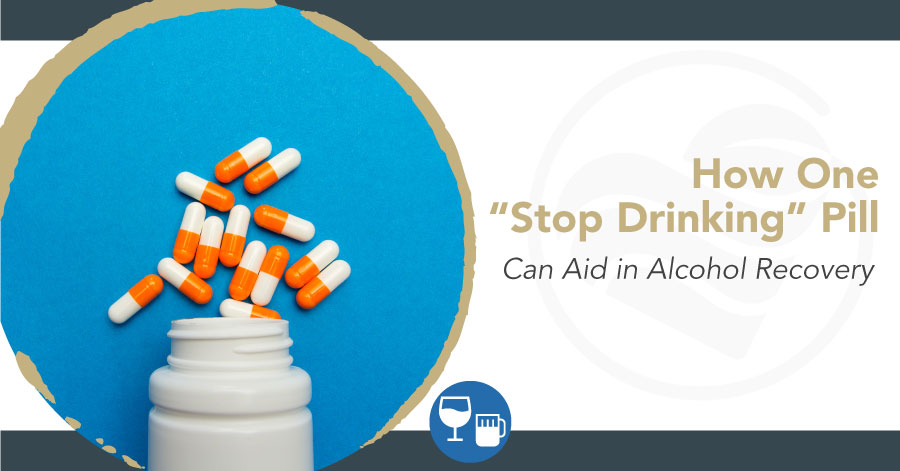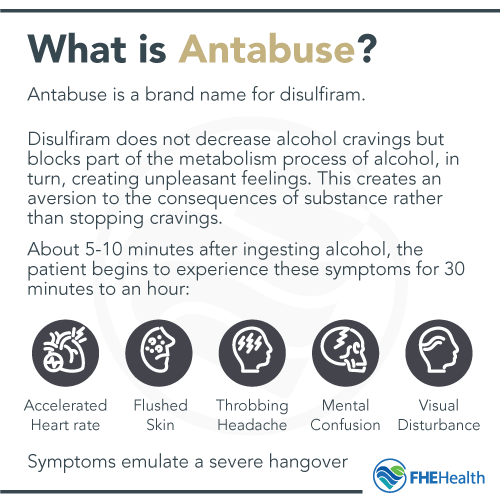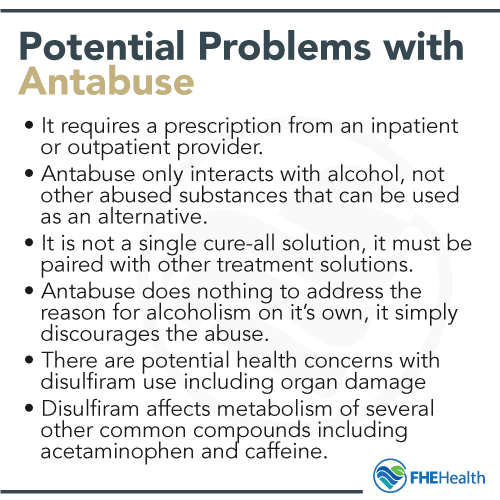
|
|
While the integration of “medically assisted treatment,” or MAT, into inpatient and outpatient addiction treatment programs is a relatively new concept, some of the drugs used in these programs are not. Antabuse — one of the brand names for a drug called disulfiram — is regarded as one of the very first medications used to help addicts recover from habitual drinking (alcoholism).
But do this drug and others like it actually work as intended? Is it really that simple? What are the practical uses and limitations in a treatment setting? Here is a complete guide to the ways in which alcoholism medications can aid in recovery.
What Is Antabuse and How Does it Work?
 Called the “stop drinking” pill, Antabuse is one of a few brand names for disulfiram. The drug’s effects in combination with alcohol were actually discovered by accident.
Called the “stop drinking” pill, Antabuse is one of a few brand names for disulfiram. The drug’s effects in combination with alcohol were actually discovered by accident.
As far back as the early 1880s, workers in rubber factories who were using disulfiram to assist in the process of vulcanizing (stiffening) rubber were experiencing severe reactions to consuming alcohol. The chemical began being used for a variety of medical purposes, but one stood out: the treatment of alcoholism.
Basically, disulfiram causes a reaction with a natural substance — acetaldehyde — in the body. Since the body converts alcohol into this substance when consumed, disulfiram reacts with alcohol to produce the following symptoms:
- Nausea, vomiting and fever
- Irregular heart rate and low blood pressure
- Breathing issues
- Headache and general weakness
- Anxiety and confusion
How Is Disulfiram Used in Alcohol Treatment?
Because Antabuse and other drugs containing disulfiram produce such an extreme reaction when the user consumes even the smallest amount of alcohol, they can have major implications in the process of detox and recovery.
Antabuse is prescribed as part of MAT, usually directly after your detox from alcohol is complete. If any alcohol remains in the body, when a patient consumes disulfiram, an uncomfortable reaction will occur. The drug’s main goal is to prevent drinking on Antabuse and drinking after Antabuse. This means that as long as a patient is taking the drug as directed, they’ll be encouraged stay sober and be able to undergo treatment programs with minimal distraction.
How Does Someone Access Antabuse?
In the United States, disulfiram is only available by prescription. This means that its potential is primarily part of a MAT program, either in inpatient, residential treatment or on an outpatient basis. Like several other treatment drugs for opiates and alcohol — Suboxone, Vivitrol, etc. — there are specialty outpatient rehab clinics that have been created to address this purpose.
Does It Work?
When taken as prescribed, disulfiram produces the intended effect: a violent aversion to alcohol. But, as The American Council on Science and Health notes, it doesn’t provide the right effects for everyone who takes it.
A few testimonials about the drug couldn’t express enough how much of a helpful influence it was in recovery, while others said they couldn’t tolerate the side effects or they still felt cravings despite the inability to follow through on them.
Problems with Antabuse in Treating Alcoholism
 The issues expressed by real patients in the above link highlight one of the major downsides of using disulfiram to control alcoholism in patients. If it’s the only treatment method used, it blunts the impact of a treatment program. MAT absolutely has a place in the modern picture of treatment but doesn’t tend to work as the only piece of the recovery puzzle.
The issues expressed by real patients in the above link highlight one of the major downsides of using disulfiram to control alcoholism in patients. If it’s the only treatment method used, it blunts the impact of a treatment program. MAT absolutely has a place in the modern picture of treatment but doesn’t tend to work as the only piece of the recovery puzzle.
Another issue: Disulfiram largely only produces reactions with alcohol. People with problem drinking behaviors may find another substance to get the same escape. For example, if people are drinking to forget or to calm their nerves, they may turn to other depressants like opiates (heroin and prescription pain pills) for the same effect. Those who imbibe alcohol to be more socially adept and “fun” may turn to other stimulants like amphetamines to replace the substance they can no longer tolerate.
Some people have naturally addictive personalities, meaning that when they focus only on the substance, it’s not likely to treat the entire issue.
This is why it’s important to treat not only the physical effects of addiction but the mental side as well. Without a holistic, comprehensive approach to recovery, the odds of treatment being effective drop significantly.
Other Drugs Used to Treat Alcoholism
Disulfiram isn’t the only chemical way to treat habitual consumption of alcohol. There are two others commonly prescribed in the United States: Campral and Vivitrol.
Campral (acamprosate)
When people quit drinking, they experience unpleasant physical and emotional symptoms called withdrawal. The discomfort of these symptoms is one of the key reasons why relapse often occurs before detox is even complete.
Campral is the brand name for a drug containing acamprosate, a chemical that reduces the unpleasant symptoms of withdrawal, making alcohol detox easier to undergo.
Vivitrol (naltrexone)
Vivitrol is more widely known as a drug that assists in recovery for people addicted to opiates like heroin and prescription opioids. While naltrexone, the active ingredient in Vivitrol, does help dull the effects of opioids, it can be helpful in treating addiction to alcohol as well.
Naltrexone for alcoholism helps reduce cravings, meaning that when used during detox, patients don’t feel the temptation to drink as strongly.
Is Disulfiram Right for You?
Whether it involves disulfiram, Vivitrol, Campral or any number of effective treatment drugs, medication-assisted treatment (MAT) can be extremely effective in treating a wide range of substance use disorders.
The important thing to remember is that MAT on its own is not a solution, bringing the efficacy of purely outpatient Suboxone clinics, disulfiram clinics and other limited treatment facilities into question.
No matter where you start treatment in the overall continuum of care, you need to find a facility that understands the need to treat addiction in a holistic way, combining MAT with other evidence-based treatments, counseling and medical supervision.
At FHE, we tailor our treatment to each individual case. To learn more about your options in recovery, contact us today.






